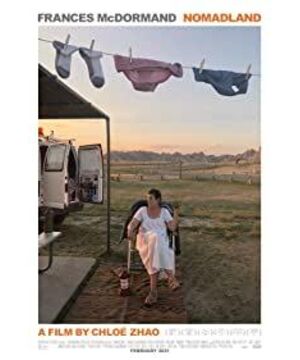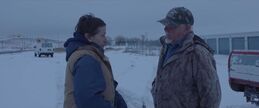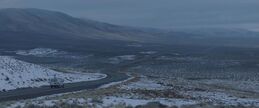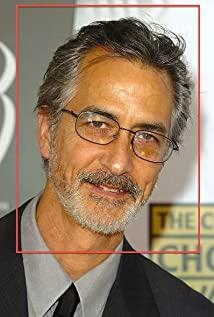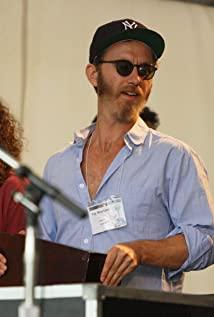In the early winter of 2011, American Gypsum closed its 88-year-old plant in Empire, Nevada, due to a slump in business. The mining town was then abandoned, and the people of the town had to go out to survive, and Fern was one of them.
At the beginning of the movie, Fern brought some simple daily necessities and drove a second-hand truck on the road alone, starting a life of car as "home". She will travel through the desolate mountains and go to the Amazon warehouse to work as a temporary worker to support her future life.
The film is based on the non-fiction novel of the same name by American journalist Jessica Bruder. Bruder spent 3 years and traveled 25,000 kilometers to observe and record the lives of more than 100 contemporary "nomads".
Thanks to Bruder's rich and detailed character material and life details, the film is extremely realistic. For example, in the RTR camp, experienced people will teach beginners the ten commandments of invisible parking in the city, how to solve practical problems such as toileting; as a service staff, Fern also needs to face rude and impolite people in the process of work. Customers; "nomads" life is not as miserable as in the news, they also party, drink, dance and enjoy life together.
As Fern's RV wandering journey continues, the life of a contemporary "nomad" is slowly unfolding before the audience. Every "nomad" on the road has a reason why they have to go on the road. Some people are unable to endure the hustle and bustle of the city because of the post-traumatic stress of war, and seek peace on the road; some people lose all their relatives and heal their souls on the road; some people feel that life is fragile and time is fleeting, and they set off with their beloved sailboats to find a real life.
But more like Linda May, the 2008 financial crisis took away not only her house, her job, but also her superannuation account. With nothing, Linda had to live in a car and work around to make ends meet.
"Nomads" work in the Amazon during the promotional season, loading and unloading beets on beet farms during the harvest season. In addition to regular seasonal jobs, they also work as cleaners at caravan parks and waiters at restaurants. During the journey, and after work, they can go boating on the river, shout in the mountains and forests, bathe in the clear spring, sit outside the car and take a nap, feel the wind, the starlight, and the life.
The film's vast, serene natural scenery and soft, lyrical soundtrack make the life of a nomad feel romantic and comfortable. Therefore, many people think that the director's criticism of capital and society is not profound and powerful, but is that really the case?
In the film, the director uses the words of Bob Wells to reveal the reason for the emergence and expansion of a new type of "nomadic" group, namely capital . The awakened "nomads" refused to buy real estate that they could not afford even with their life savings, and only accepted necessary consumption, thus gaining a certain degree of freedom.
But can being a "nomad" free itself from the shackles of the dollar? the answer is negative. Nomads still need money to maintain their lives. The so-called freedom and romance are vulnerable . Fern can't even afford a car repair, not to mention possible unexpected expenses such as illness.
Hegel said that "the migration of nomadic tribes is only formal, because it is confined to the same space." The freedoms Fern and contemporary "nomads" have are also limited and formal. In order to survive, they must constantly travel and work.
In the opening scene, Fern was forced to go on the road. The china from her father, the fish hook from her husband, and the photos she looked at in the dark all showed Fern's nostalgia for her family, love and past life. She was trapped in her memories and could not escape.
In the second conversation with Bob, she admitted that she had been staying in Empire, the same town, the same house, in order to keep the traces of her husband Bo once existed.
Desperate to set out, she pulled Fern out of her memory and became an opportunity for her to get out of her obsession. She still misses Bo, the ring on her hand has never been taken off.
But from now on, she can make new friends and have a new life instead of dwelling on the past. Taking back control of yourself is a by-product of "RV life" for Fern. This is luck in misfortune.
At the end of the film, Fern rejected the invitations of his sister Dolly and his friend Dave to live together, and returned to Empyre to deal with the stored daily necessities, bid farewell to his former home, and set off on the road again.
Farewell to go again, this ending seems full of hope. But where will Fern go, where can she go?
It is not difficult to speculate that what awaits Fern and the "nomads" is nothing but a work trip year after year, rushing to a fixed place and doing a fixed job at a fixed time. As they continue to grow older, they will have fewer job and income choices, and eventually cannot cover the increasingly high expenses of "RV" maintenance, medical care, etc.
Bob guides everyone to unite and help each other to help the new "nomads" adapt to their new life as soon as possible. But the tragedy of contemporary American "nomads" cannot be solved by this.
In Jena's Philosophy of Reality, Hegel said that "money is a concept that exists in material form, a single form or possibility of all objects of need. Needs and work are raised to this general level. , a huge system of common interests and interdependence is formed among people. This is the life of the dead, and runs on its own life. It rushes around blindly like a beast, and it should be controlled and controlled at all times. tame ."
Only on the day when the capital that will collide and destroy the lives of ordinary people is put into a cage, can the tragedy of the "nomads" be brought to an end.
In addition to huge capital, the enemies that vulnerable groups need to face also include the common indifference in society, and the resulting pessimism and despair.
In 2020, the epidemic swept the world and the economy was temporarily shut down. It must have been a difficult year for the contemporary "nomadic" group. The consolation is that they got the attention of reporter Bruder, producer and star McDormand, and director Zhao Ting.
In this year, the movie "Nowhere to Be" won numerous awards including the Golden Lion Award. The expansion of public opinion brought about by the release of the film has brought greater attention and concern to the local "nomadic" group, which may make their survival easier.
Starring McDormand's superb acting makes the audience feel the whole process of Fern's journey. The many supporting characters in the film and their stories are also unforgettable.
Director Zhao Ting has the habit of using a lot of amateur actors in her works. We can all see the faces of non-professional actors in "The Song My Brother Taught Me to Sing" and "Knight".
"Nowhere" is no exception, Linda, Bob, and Swanky in the play, they are all subjects of Broder's follow-up interviews. They are not acting, but showing how they "live".
In the face of the hardships imposed by life, Linda is warm and enthusiastic, and has always longed to build a ship of the earth - a house that can be self-sufficient, pollution-free, and can survive for a long time; Bob helps and guides the new "nomads", I hope to save as many people as possible from the tyranny of the Academy of Fine Arts; Swanky is terminally ill, but he does not complain, and enjoys the beauty of nature in the last moments of his life.
Actively "alive" because nomads still have hope, but does that hope really exist? Will the fate of the tragedy be reversed?
View more about Nomadland reviews


